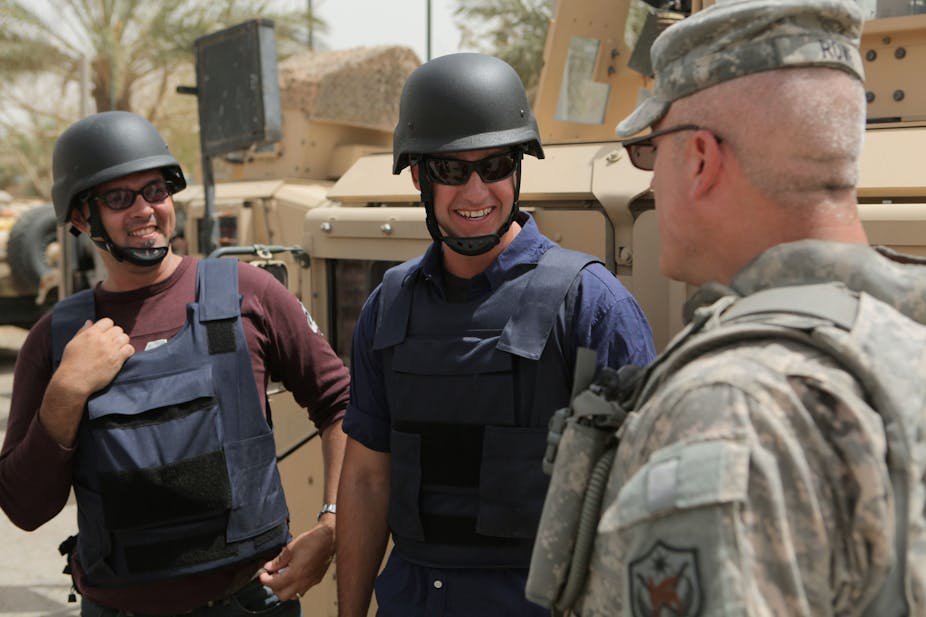SBS’ recent three-part series Go Back to Where You Came From is, simply, a manipulative piece of media spin calculated to redress the balance of a media spun too far towards racist insularity.
The intentions are unquestionably good; the program is well-made or, rather, it is a creditable copy/pastiche of similar commercial tosh; and the intended audience, the converted who always want to be preached to, appear to have swallowed it whole.
If you haven’t seen it – and, by the way, it’s probably only essential viewing if you have strong antipathy towards refugees aspiring to live in Australia – the concept is thus: “six Australians with strong views on the subject” of what we naively call “boat people” have been invited to come on a journey which might change their minds.
Whether they have been induced to go on the trip with financial or some other incentive is never made clear in the program; are these people so firm in their desire to not know truth, that they will go out of their way to face their ignorance head-on?
They are presented to us as three men and three women living suburban lives although at least one, retired social-worker Raye, is actually presented as rural. Their backgrounds are quickly summarised to the degree we understand them as types.
Their political outlooks are varying degrees of conservative bar one, the Newcastle country singer Gleny, who from the outset is certain “I’d love to have a refugee come and stay with me.”
The others are a closed-minded mixed bag. Adam, a Cronulla lifeguard from “the Shire” (that is, Sutherland) is appalled by the Australian government’s willingness to continue “housing criminals”, by which he means “illegals”.
He staunchly wears his sunglasses on the back of his neck to the end of the series. Roderick, a “centre right government-hating freedom-loving libertarian” but also, somehow, a Young Liberal, has a range of crisp, funky conservative t-shirts (“Keep Right”, “Tony Abbott” and Julia Gillard as “same tree, different lemon”) and enough nous to never deviate strongly from his party line.
Darren is a cipher, who like Roderick keeps his true feelings to himself (admitting late in the series that he has been profoundly affected by what he has seen, but not to the extent of altering his opinion). Raye is an oddity whose hostility towards refugees seems to stem from a detention centre having been opened up on land adjoining her farm, at which she rather stiltedly claims she would happily shoot its residents.
The show’s piece-de-resistance, however, is the youthful Raquel, who ticks a hundred boxes in the middle class checklist of signs to watch out for if you’re worried your child might be becoming a bogan, beginning with her slurred drawl and her freely expressed distaste for “Africans”.
The six go on a journey that takes them through a version of the refugee experience in reverse – meeting displaced persons now settled in Australia; an abortive boat ride to nowhere in particular; holding camps in Malaysia, then in Africa; and then to two places where political upheaval caused millions to flee.
Periodically, they are visited by the photogenically steely-eyed Dr David Corlett who prods all but Gleny to see if their attitudes have changed.
In the middle of this, Raquel is the one most focused upon and the most extreme within the show. She has no insight, and even her confessional conversion to an enlightened position towards the end seems as unbelievable as much of the drivel she has been delivering throughout.
The camera loves her, and the writing and editing of the show infantilises her (her terror, for instance, at using primitive toilets – which, by the way, is nervewracking for many global tourists).
I would imagine that, while for most of the viewers of this show – would you watch a program like this unless you wanted to see racists punished? – the schadenfreude runs particularly hot as Raquel gets her comeuppance.
Yet the brief biographical snippets of her short life suggest a different program might as easily have been made presenting Raquel as a victim: that she left school at 14, and her family home soon after, indicates some hard knocks indeed.
“We’ve all got hearts, we’ve all got feelings,” she says at one point, defensively as well she might; many in the audience no doubt derided her for this as ardently as they laughed at her “I’m not no fucking refugee.”
Audience response is individual and difficult to generalize about. I can only guess that the vast majority of viewers of Go Back to Where You Came From (GBTWYCF) enjoyed skillfully crafted television, uncritically, and had their own prejudices – towards people who would “turn back the boats” – cosily confirmed.
To my mind, in the final analysis GBTWYCF is one more symptom of a polarized society. Perhaps it asks the wrong questions, or is too literal when it comes to attempting to foster empathy.
While personally I believe Australia is not taking a hundredth of the refugees it should, I am uncertain as to whether GBTWYCF is a constructive exercise, though of course you can’t blame SBS for showing a program that would do more good in prime time on Channel 9 – you can only blame Channel 9 for not taking on such a project.
A commercial station could have rated through the roof with this kind of thing.

